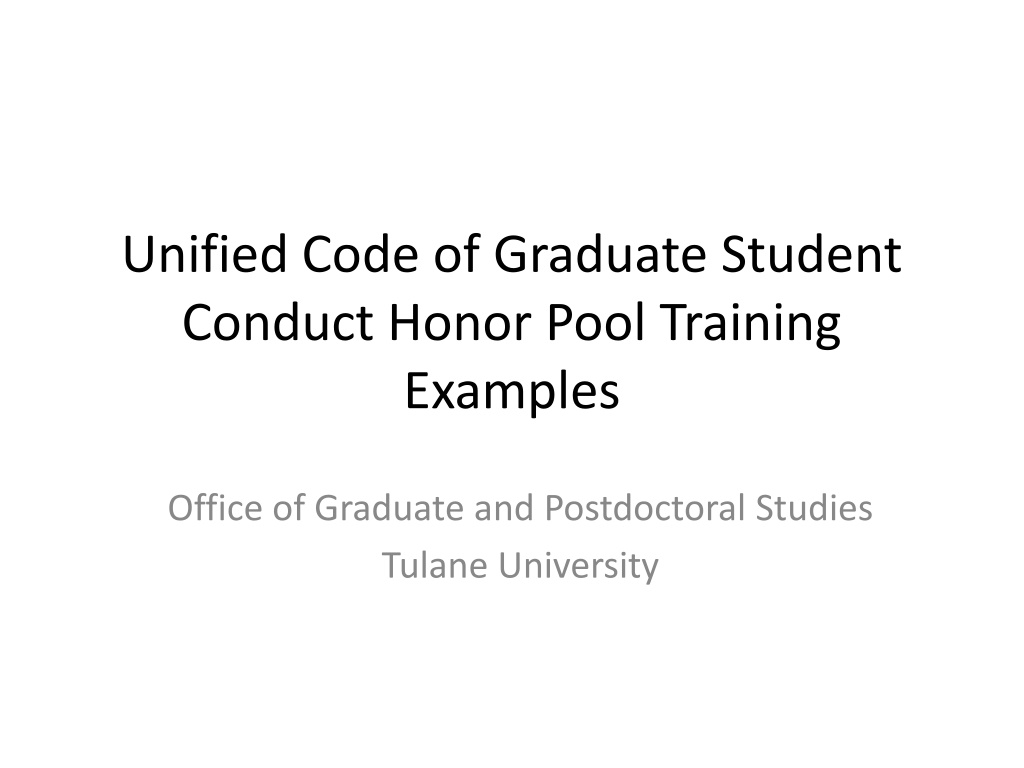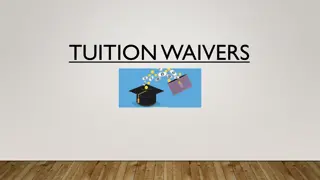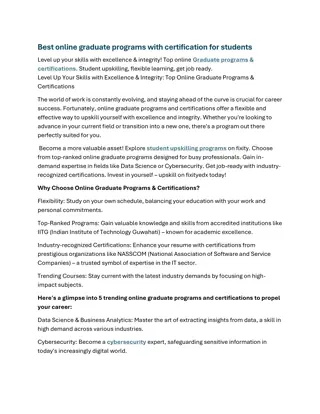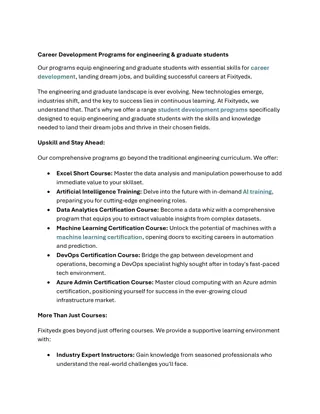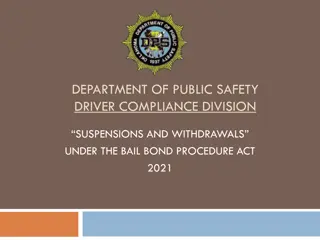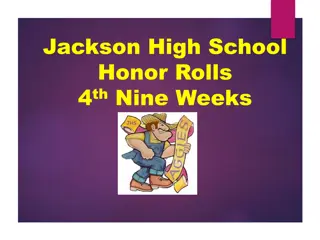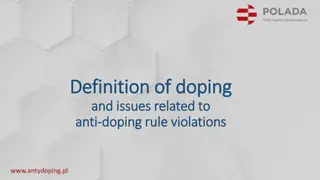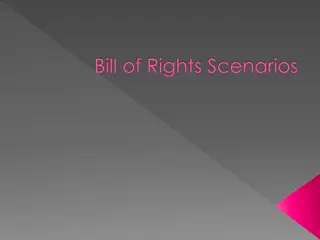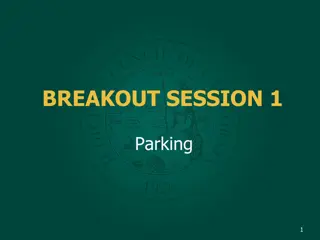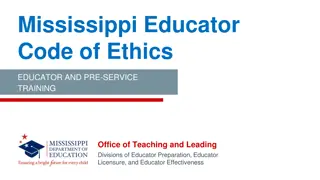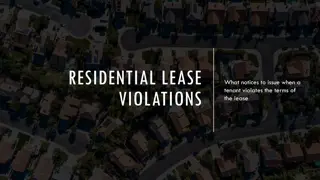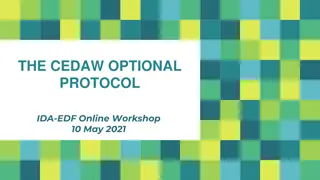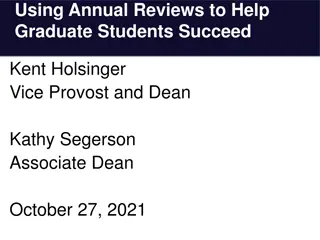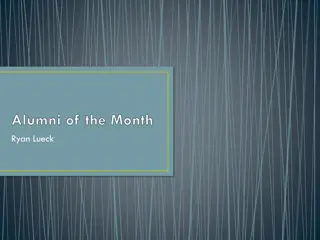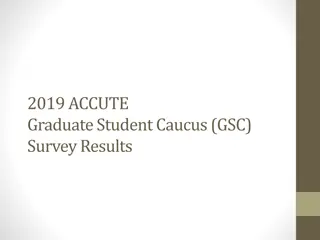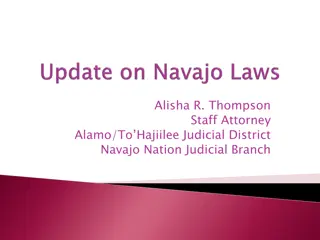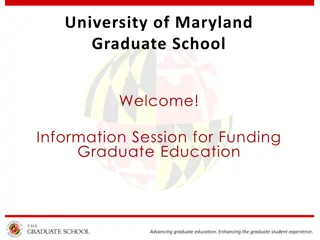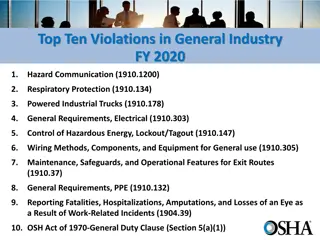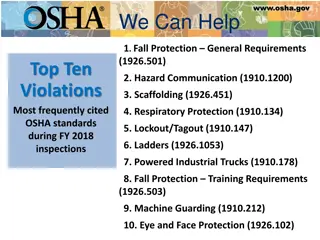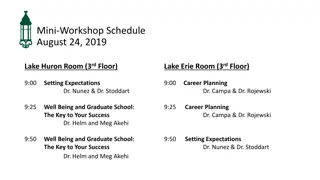Examples of Graduate Student Honor Code Violations
Examples of ethical dilemmas faced by graduate students in upholding honor codes, including situations related to proper citation, time management during exams, attributing sources correctly, and confronting academic dishonesty within peer relationships.
Download Presentation

Please find below an Image/Link to download the presentation.
The content on the website is provided AS IS for your information and personal use only. It may not be sold, licensed, or shared on other websites without obtaining consent from the author. Download presentation by click this link. If you encounter any issues during the download, it is possible that the publisher has removed the file from their server.
E N D
Presentation Transcript
Unified Code of Graduate Student Conduct Honor Pool Training Examples Office of Graduate and Postdoctoral Studies Tulane University
Example #1 Richard is writing a research paper for his history research seminar. While reading for his project, he finds a passage in Howard Zinn s A People s History of the United States that perfectly states the idea he is trying to get across. Richard reads the passage carefully, and decides to paraphrase it by putting the idea in his own words. Because the writing is his own, and he already had the idea before he accessed the book, he feels that he does not have to cite the Zinn in his paper. Would this be considered a violation of the Honor Code? If so, what should Richard have done differently? Adapted from Rice University Honor Council Orientation, http://honor.blogs.rice.edu/files/2012/08/Rice-University2.pdf
Example #2 Christina has a take home examination for a graduate- level chemistry class, and has two hours to complete the assessment. Christina chooses to take her exam in her apartment; however, in the course of completing her test, she loses track of time and accidentally continues to work on her test 15 minutes longer than the allotted time. Since it is a take home test, and it was an honest mistake, Christina decides to say nothing about the incident. Did Christina violate the Honor Code? If so, what could she have done differently? Adapted from Rice University Honor Council Orientation, http://honor.blogs.rice.edu/files/2012/08/Rice-University2.pdf
Example #3 Henry is struggling to finish a finance term paper the night before it is due. In the course of his frenzied work, he comes across a quotation for which he forgot to record the proper source. Because he is flustered and only has a few hours to finish his assignment, Henry attributes the quotation to a book and author that he had previously referenced, but from which the quotation did not originate. He assigns the quote a random page number. Because the quote did come from a source, Henry did acknowledge that the words were not his own, and cited a source that does exist, he does not believe he has violated the Honor Code. Did Henry violate the Honor Code? If so, what could he have done differently? Adapted from Rice University Honor Council Orientation, http://honor.blogs.rice.edu/files/2012/08/Rice-University2.pdf
Example #4 Megan, a graduate student, and her roommate Leah, a senior, are in the same cross-listed introductory graduate-level mathematics class. One evening, the graduate students in the class are assigned to complete a closed book, closed note take home quiz on Blackboard that Leah does not have to complete. Leah notices her roommate open the tab for the quiz, and subsequently take out her textbook. Megan flips through pages, and obviously references the book throughout the course of the assessment. Not wanting to ruin her friendship or make her living situation awkward, Leah says and does nothing even though she is aware of the fact that her roommate has violated the Honor Code. Is Leah in violation of the Honor Code? Is Megan? If so, what should either one have done differently? Adapted from Rice University Honor Council Orientation, http://honor.blogs.rice.edu/files/2012/08/Rice-University2.pdf
Example #5 Craig and Jake are graduate student in the same biomedical research group, both taking thesis/research for credit this term. Because their work is so inter-related, it is common for them to collect data, take notes, and complete their experiments together. Their advisor, Prof. Smith, is very clear that their end-of-semester research reports for a thesis/research grade should be their own work, no matter how much they have collaborated on their projects. The two students work together appropriately in the completion of the experiments. When it comes time for them to craft their independent reports, they decide to sit at the same table in HowieT, so they can ask each other questions if any arise. As they work on their reports, they exchange a few ideas about the project that ultimately end up in both reports. Did Craig and Jake violate the Honor Code? If so, what could they have done differently? Adapted from Rice University Honor Council Orientation, http://honor.blogs.rice.edu/files/2012/08/Rice-University2.pdf
Example #6 Jennifer s thesis advisor, Prof. Jones, asks her for some preliminary data and analysis for an NSF proposal she is preparing. Jennifer willingly provides the information and is provided a copy of the final proposal by her advisor. Six months later, Jennifer successfully defends her thesis, and the appropriate paperwork is signed by her advisor and committee including the thesis and thesis abstract pages. Jennifer immediately finds an entry-level tenure-track position at a prominent university. One month after Jennifer has started work, Prof. Jones begins preparing another NSF proposal and consults Jennifer s published thesis. Her advisor had not read the thesis prior to Jennifer s defense presuming that as advisor she already knew what was in it. No committee members objected to the thesis or the presentation at the time of its defense. Upon review, Prof. Jones finds that the vast majority of the thesis is very similar to the original NSF proposal she submitted. Although some of the data and analysis are clearly Jennifer s, a disturbing amount of additional information and analysis are from Prof. Jones original proposal, although some wording has been changed slightly, but without reference to the proposal. Prof. Jones wishes to pursue an Honor Code violation for Jennifer and have her degree revoked. Did Jennifer violate the Honor Code? If so, what could she have done differently?
